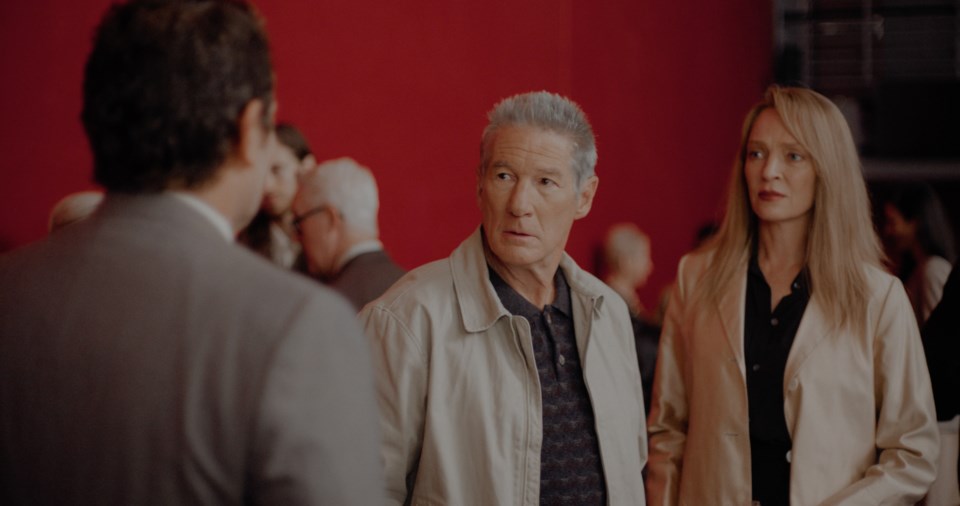CANNES, FRANCE — Richard Gere says he contemplated coming to Canada to avoid being sent to the Vietnam War.
The actor plays a draft dodger in Paul Schrader’s film "Oh Canada," and like his character, was a conscientious objector as a young man, he tells a group of journalists at the Cannes Film Festival a day after its premiere.
“I ended up running,” Gere says Saturday, careful to reveal little about how he dodged authorities.
But instead of fleeing to Canada as his character does, he moved to the U.S. West Coast.
“The draft board was harassing my parents and the neighbours where I was. So I came back, went through a process and that's when they decided I (did not have the) mental stability that they wanted to give me a gun.”
Gere reteams with the director who made him a star in 1980's “American Gigolo,” this time to play Leonard Fife — a Montreal-based documentary filmmaker who is celebrated for taking a stand against the Vietnam War by fleeing to Canada, and for turning his camera on atrocities like the development of Agent Orange in New Brunswick and residential school violence.
In the film, Leonard is feted at a Montreal film festival and touted as a winner of Genie and Gemini awards — precursors to the Canadian Screen Awards which combined the film and television prizes.
A filmmaker contracted by the CBC, played by Michael Imperioli, is making a celebratory profile of Leonard and compares him to Toronto piano virtuoso Glenn Gould.
However, Leonard is terminally ill and hijacks the interview for a deathbed confession, coming clean about his life in front of the camera and his wife, played by Uma Thurman.
The movie, an examination of where the truth lies in documentary filmmaking and memory, is largely set and steeped in Canadiana, but it wasn’t shot north of the border.
“It cost too much,” Gere says to a chorus of laughter.
“We did it right where we all lived so we didn’t have to pay per diems.”
Based on the Russell Banks novel "Foregone," the film jumps back and forth in time following Leonard's not exactly reliable memories, which continue to deteriorate as he succumbs to cancer.
Leonard's younger self is played by Jacob Elordi, the heartbreaker from "Saltburn" and Sofia Coppola’s Toronto-shot "Priscilla."
Elordi did not attend the Cannes premiere for "Oh, Canada," because he was actually in Canada to shoot Guillermo del Toro’s "Frankenstein." Toronto fans have taken to social media in recent weeks to share sightings of the "Euphoria" star.
It's hinted that the young Leonard may have had less altruistic reasons for opposing the war, his activism revealed as an opportunistic act. When asked about present-day political activism, Schrader suggests it can be similarly muddled by individual opportunism and unrelated grievances.
Schrader takes particular issue with the way criticism against atrocities in Gaza has been conveyed by some protesters: “Some of which is antisemitism masking itself as political correctness.”
“These people don't have, really, skin in the game. They're not going to get drafted. (Only) a handful of them are Palestinian,” he says.
“A lot kids are just doing this cosplay. Cosplay revolutionaries. Let's dress up. Let's put the kaffiyeh on. Let's shout. And then afterwards, let's go to McDonald's.”
“It’s not the level of seriousness as it was with Vietnam – when people actually had skin in the game, when they were getting drafted and they were going (to war) and their friends were dying,” he continues.
Gere says American activism in the 1960s was much different to activism today.
“The '60s was an explosion of possibilities and challenging everything. The youth movement of that time was in all the universities. It was in high schools,” he says.
“It was going in this other direction questioning the status quo support, order of how things are done in the world. And I don't think that’s happened here.”
— Radheyan Simonpillai is a freelance writer based in Toronto.
This report by The Canadian Press was first published May 18, 2024.
Radheyan Simonpillai, The Canadian Press



